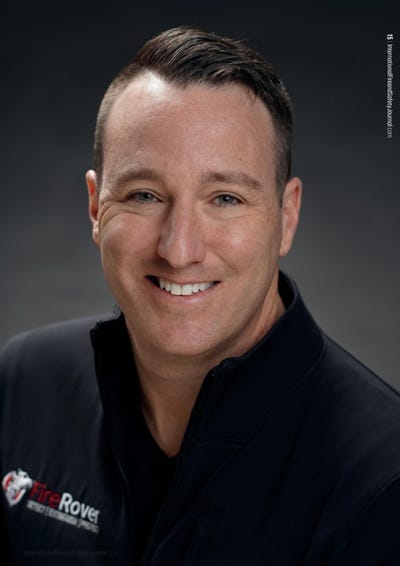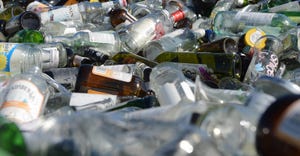A Safety Discussion with Industry Vet Shawn “Doc” Mandel of Waste Connections
This week marks the first official day of summer, which means the “summertime spike” is officially here. During this season, we must be more mindful about the waste and recyclables we’re picking up and processing as more hazards are bound to be in our waste and recycling streams. As we kick off the summer, I recently sat down with one of the industry’s most seasoned safety experts to discuss how we can prepare for these fire risks and ensure our facilities and employees remain safe.

This week marks the first official day of summer, which means the “summertime spike” is officially here. During this season, we must be more mindful about the waste and recyclables we’re picking up and processing as more hazards are bound to be in our waste and recycling streams.
As we kick off the summer, I recently sat down with one of the industry’s most seasoned safety experts to discuss how we can prepare for these fire risks and ensure our facilities and employees remain safe.
May 2024 Fire Data
In May, we experienced 46 fires, 23 of which occurred in waste, paper and plastic operations, 15 occurred in metal operations, four occurred at hazard material recycling operations, three occurred in organics operations and one occurred at a rubber recycling facility. Eight of these events were confirmed as catastrophic, but that number is highly conservative based on the public reporting without long-term visibility of the actual damage stemming from these incidents. At Fire Rover, we successfully responded to 250-plus fire incidents at our clients’ facilities.

The summertime spike is here, and like all other years, May’s increased number of fires is felt personally throughout my world. There have been more reported fires, more catastrophic fires and more of our Fire Rover clients that are dealing with fire incidents at their facilities.

When we look at the first five months of the year, we have incurred 161 fires at our waste and recycling operations. This is the highest number of five months from fires since the lithium-ion battery epidemic took hold on our operators in 2018. We are in line to hit all-time highs, or we could start to ramp down like we have in other years. All we can do is keep an eye on the future and hope that this year, the summertime spike will be more muted than in years past.
But please remain diligent and know the summertime spike in fires is not just caused by lithium-ion batteries in the waste stream but by heat, dryness and increases in other fire-causing hazards like fireworks, firework embers, hot loads, hot barbecues, propane tanks, pool chemicals and more.
A Conversation with Shawn “Doc” Mandel of Waste Connections
Most folks don’t know this, but true safety professionals are drawn to their careers because they are inherently driven by helping prepare folks to be successful in their operations. Shawn was no exception to this rule. Most see him as an experienced safety executive who strives to live his life based on his personal values of God, Family and Country. He grew up one of three, the son of a minister who lived a modest lifestyle. So, like many kids in his situation in the early 80’s, he joined the military. He enlisted to become a Navy Corpsman, where after completing boot camp and hospital corps school, he worked in the orthopedics, same-day surgery units and the emergency room at the Naval Hospital San Diego. He was later selected to attend specialized training for the Fleet Marine Force at Camp Pendleton and upon graduating assigned and deployed with the legendary 3rd battalion, 5th Marines, where he was responsible for the health and wellness of the Marines in his unit to ensure they were combat-ready. Following eight years of service that included multiple deployments with various units within 1st Marine Division and later 3rd ANGLICO, Shawn was honorably discharged.
Wanting to be close to his young family, Shawn finished his military service following Desert Storm, expecting to pursue a career as a paramedic, nurse practitioner, or in law enforcement search & rescue, that is until fate stepped in. Shawn’s brother-in-law tapped him for a district health and safety manager role at BFI in Southern California, where he was responsible for ensuring the safety of employees at post-collection operations, including MRFs, transfer stations and landfills.
Shawn continued to sharpen his skills as a leader in safety from BFI to Allied and Allied to Republic Services, eventually getting a call from Waste Connections in 2010 to bring him to his current role as VP of Safety. Shawn has been married to the love of his life, Cynthia, for 30 years. They have four grown children and two grandchildren.
Tell us about your approach to safety.
At Waste Connections, we lead by our core values. Our culture of servant leadership inverts the traditional hierarchy and puts employees’ needs before those of the leaders. We are constantly looking out for our people first. The value prop we have instilled to the core is that priorities can change, but values do not change. We refer to this as our decision tree so if and when there is a diversion, it needs to be addressed. (1) Safety, (2) integrity, (3) customer service, (4) providing a great place to work, and (5) premier waste services company in the industry.
One example of this occurred early in my tenure at Waste Connections. We had a tragic incident occur to one of our team members. The question to me when I was on site was not about our exposure to the incident or compliance concerns, but Ron only wanted to know what the family needed and what we need to do for the rest of the team that was impacted. Leadership is key. Leadership from the top. Exposure/compliance is certainly important, but taking care of our people always comes first.
Was there a moment when it hit you that batteries in the waste and recycling streams were not going away?
We never saw these types of fires in the ‘90’s. Of course, we had hot loads and chemical reactions, improperly disposed propane tanks, but in 2015, we started to see the batteries causing fires in our facilities. We needed to figure out a solution ASAP. Our folks were not prepared, and traditional sprinkler systems were not the solution. Unfortunately, as an industry, we had to lose some facilities to get the attention the problem needed. We all had to learn the hard way. We thought that there would be an easy fix like with car batteries, we never saw it and we still don’t have it today. We started looking for technology. Began, incipient stage fire brigade training for our employees. This certainly helped, but as the epidemic grew, we realized we needed to get a solution. The reality was that once these fires were too big, our team needed to evacuate, and the fire officials were ok to lose the building but that was not a good solution for us as an industry needed to provide this essential services.
What have you done to prepare your operations for the threat of fires in your waste and recycling streams?
We have learned that protecting our operations from fires is not a one-pronged approach. We have added a number of operational changes, including additional load checks and battery storage isolation plans and more. We are implementing Incipient Stage Fire Brigades at our sites that include on-going training. We have invested in portable compressed air foam units that allow our team to keep a safe distance while still providing suppressant to the hazard. We have committed to invest in technologies like Fire Rover that help us detect these fires as early as we can. We are evaluating and testing new products/solution as they come even working on some innovation in house. The fact is that it is going to take all of these and more to really solve the problem.
Tell us about your experience working with insurance companies. Do you find they are open to your approach to mitigating fire risks?
Our job is to work with the insurance companies to educate them on what we are doing to mitigate that risk on both the property side and the casualty side. We have no secrets. Certain technologies and operational investments, along with our investment in Fire Rover, were front and center on our risk mitigation presentations to the insurers. We are preparing for the risk of the business as best as we can. Our number one goal is to protect our employees, so we never stop. If the insurance companies become unreasonable, we are going to bet on ourselves with our investment in training, technology, and people.
What advice would you give to your industry peers regarding handling fire risks in their operations?
Safety is not proprietary. Waste Connections is an open book, and we share everything we do with our peers to help mitigate risks industrywide. We are all negatively impacted when bad things happen to industry peers.
Where do you see the threat of fires in the future?
Short term—not a one-fix situation. Long-term, we need legislation that puts some ownership on the manufacturer's “they need skin in the game” to help with the battery and its post-life. It is not going away in the short term.
Conclusion
I asked Mandel if he had any final thoughts, and he shared that his love of this industry is really driven by the people. Mandel has huge responsibilities on his shoulders, and the actions he and his team complete daily save lives and contribute to the health and safety of so many employees and the public. These actions are driven by the mentality of “work hard, play hard,” and as an avid believer of this mantra, I encourage all of you to do just that.
Ryan Fogelman, JD/MBA, is vice president of strategic partnerships for Fire Rover. He is focused on bringing innovative safety solutions to market, and two of his solutions have won the distinguished Edison Innovation Award for Industrial Safety and Consumer Products. He has been compiling and publishing the “Reported Waste & Recycling Facility Fires In The US/CAN” since February 2016 and the “Waste & Recycling Facility Fires Annual Report.” Fogelman regularly speaks on the topic of the scope of fire problems facing the waste and recycling industries, early detection solutions, proper fire planning and early-stage fire risk mitigation. Additionally, Fogelman is on the National Fire Protection Association’s Technical Committee for Hazard Materials. (Connect with Ryan on LinkedIn at https://www.linkedin.com/in/ryanjayfogelman or email at [email protected])
Read more about:
SafetyAbout the Author
You May Also Like


.png?width=300&auto=webp&quality=80&disable=upscale)

